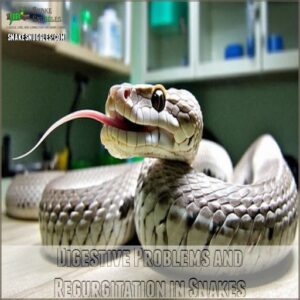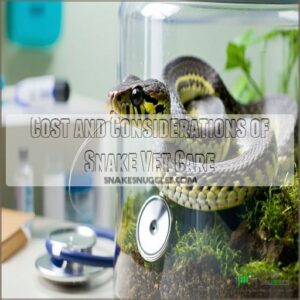This site is supported by our readers. We may earn a commission, at no cost to you, if you purchase through links.

You’ll want someone with the right credentials, like herpetological training and licensing, to handle your slithery friend properly.
Convenience is key, so consider a clinic that’s nearby and equipped with specialized snake care tools.
Don’t forget to check if they offer emergency services—snakes can be slippery customers regarding health surprises.
Routine vet visits for preventive care are as important as a heat lamp in winter.
Keep an eye out for future tips on ensuring your snake’s health and happiness!
Table Of Contents
- Key Takeaways
- Choosing The Right Snake Veterinarian
- Importance of Veterinary Care for Snakes
- Common Health Issues in Snakes
- Preventive Care for a Healthy Snake
- Signs of Illness in Snakes
- How Often Should Snakes Visit The Vet
- Cost and Considerations of Snake Vet Care
- Frequently Asked Questions (FAQs)
- What kind of vet do you take a snake to?
- Is it expensive to take a snake to the vet?
- How often should snakes go to the vet?
- Do veterinarians handle snakes?
- What emergency care options are available for snakes?
- How can I find a new vet after moving?
- Are telemedicine services available for snake consultations?
- What to expect during a snake surgery recovery?
- How do I ensure proper anesthesia for my snake?
- Conclusion
Key Takeaways
- Look for a vet with specialized reptile expertise and herpetological training to ensure your snake gets the best care.
- Consider the location and availability of emergency services at the vet clinic for quick access in urgent situations.
- Regular check-ups are crucial for early detection of health issues, so schedule annual visits with a reptile specialist.
- Prepare for vet costs, including routine and emergency visits, and consider pet insurance to manage expenses effectively.
Choosing The Right Snake Veterinarian
Finding the right snake veterinarian guarantees your scaly friend gets the expert care they need.
You’ll want to think about the vet’s expertise with reptiles, convenient clinic location, and availability of specialized snake care equipment.
Expertise and Experience With Snakes
Finding the right snake vet is vital for your scaly friend’s health.
You want someone who truly knows their stuff.
Look for these key things:
- Veterinary credentials: Check their licensing and certifications.
- Reptile expertise: Does their practice focus on reptiles?
- Herpetological training: Have they worked with snakes before?
- Snake handling: Experience in handling snakes safely is a must. Don’t trust your snake’s health to just anyone!
Availability and Location of Vet Clinics
Although finding snake vet clinics might seem challenging, focus on Vet Clinic Accessibility and Local Snake Specialists to make it easier.
Emergency Care Availability is vital, especially in emergencies.
Rural Vet Services can be hard to find, but Mobile Vet Options might save the day.
Prioritize the best reptile vet nearby to guarantee excellent veterinary snake care and peace of mind, with a focus on Local Snake Specialists and Emergency Care Availability for optimal support.
Facilities and Equipment for Snake Care
Imagine a premium snake vet clinic:
They’ve got humidity control systems to keep your slithery pals comfy, veterinary scales for precise weight checks, and snake incubators for rare herpetological moments.
Even snake restraint devices and portable quarantine units are on hand.
These tools aren’t just fancy; they’re fundamental in reptile veterinary care, ensuring top-tier snake health care right where it matters.
Emergency Care Services for Snakes
When choosing a vet, consider how quickly they can provide veterinary response time for emergencies.
A snake emergency kit and access to critical care units with reptile specialist triage are lifesavers.
Check for emergency transport options, ensuring your snake vet care includes rapid response for snake health issues.
Prioritize reptile veterinary care that’s quick and efficient, with a focus on rapid response and emergency transport for optimal snake health issues.
Importance of Veterinary Care for Snakes
Your snake’s health depends on regular vet visits, just like your own! Finding a reptile specialist guarantees your scaly friend receives the specific care they need to thrive.
Unique Healthcare Needs of Snakes
Finding the right vet connects directly to understanding a snake’s unique needs. These critters hide ailments well, so keeping an eye on signs of trouble is key, and having the right supplies from a trusted source like a Best snake vet can also make a difference.
Monitor for:
- Scale rot treatment: Look for weird discoloration or sores.
- Snake anorexia: Notice if they’re skipping meals frequently.
- Ocular problems: Cloudy eyes or frequent rubbing could signal issues.
Your vet helps with these situations, ensuring excellent snake medical care.
Research and Identify Reptile-Specialized Veterinarians
To find the best reptile veterinarians, tap into online resources like Reptile Vet Directories and Herp Vet Reviews.
Join Snake Health Forums to discuss reptile medical care and explore Local Reptile Groups for insights.
These platforms offer valuable info on reptile veterinarians specializing in snake veterinary services, ensuring your pet gets exceptional reptile vet care when needed.
Seek Recommendations From Reptile Enthusiasts and Breeders
Connect with reptile enthusiasts to find excellent vet care for your snakes.
Explore community forums and breeder networks, where folks happily share insights on reliable snake care specialists.
When searching for a vet, look for membership in the Association of Reptile and Amphibian Veterinarians (ARAV) reptile vet recommendations.
Online reviews and local herpetological societies are goldmines for vet referrals.
These connections give you peace of mind, knowing your pet’s health is in capable hands with trusted reptile care specialists.
Common Health Issues in Snakes
When caring for your scaly friend, it’s important to recognize common health issues.
Like respiratory infections, digestive problems, and skin conditions, these issues can be detrimental to your snake’s health.
Early detection and treatment by a knowledgeable vet can make all the difference in keeping your snake healthy and thriving.
Respiratory Infections and Respiratory Distress
Understanding your snake’s unique healthcare needs often uncovers concerns such as respiratory infections.
These can sneak up on you, manifesting as breathing difficulty due to improper humidity levels or infrequent misting, which can be mitigated with the use of effective reptile humidifiers systems.
Symptoms and causes vary, but prompt veterinary snake health interventions are vital.
Trusting snake care experts at reputable snake veterinary clinics provides effective treatment options and maintains reptile health care standards.
Digestive Problems and Regurgitation in Snakes
When your snake’s meal comes back up, it can be alarming. Regurgitation causes include stress, improper temperature, or overfeeding.
Keep digestion smooth by ensuring:
- Consistent temps: Use a thermostat to maintain suitable temperatures.
- Diet check: Consider digestive enzyme supplements for balance.
- Veterinary care: Visit snake veterinary clinics for persistent issues.
Gastrointestinal blockages or impaction symptoms need expert attention.
Skin Conditions and Parasite Infestations in Snakes
Snakes can face skin woes like pesky mites or fungal foes.
If your snake’s scales look funky or shedding’s a struggle, it might be time to visit the best snake vet.
They’ll help you tackle conditions like scale rot and implement parasite control.
Caring for snake health means addressing any snake diseases promptly with expert reptile vet services.
Preventive Care for a Healthy Snake
Preventive care is key to keeping your snake healthy and thriving, so schedule regular vet check-ups.
Make certain they’re eating a balanced diet.
Creating an enriching environment with the right temperature and humidity can make a world of difference in your snake’s well-being.
Regular Health Check-ups and Examinations
For your snake’s health, think of annual checkups as essential pit stops. They help in early detection and better snake health monitoring.
During these visits, include:
- Blood tests for detailed insights.
- Fecal examinations to catch parasites early.
- Weight checks to make sure your snake isn’t too hefty or sleek.
With these, you’ll keep your slithery pal in top shape!
Proper Nutrition and Diet for Snakes
Just like regular check-ups keep things on track, snake nutrition is key to their wellness.
Pay attention to spice up the snake diet with the right prey items. Think variety! Meal frequency matters, too.
Check out the table for reptile care tips:
| Key Factor | Recommendation | Notes |
|---|---|---|
| Nutrient Needs | Balanced Prey | Mice/Rats |
| Meal Frequency | Weekly/Bi-weekly | Age/Size-Based |
| Prey Selection | Size Matters | Avoid Overfeeding |
| Water Access | Fresh Water Daily | Soaking Option |
Enclosure Design and Environmental Enrichment
When crafting the perfect snake habitat design, think of it like building a dream home for your slithery buddy.
Use bioactive substrates and naturalistic decor to mimic their natural environment, and consider choosing the right snake species for a harmonious and thriving coexistence, such as spotted pythons for beginners.
Temperature gradients, humidity management, and secure hiding and climbing structures are essential in snake enclosures.
It’s about providing snake enrichment that keeps them happy and healthy for the long haul.
Signs of Illness in Snakes
Keeping your snake healthy requires spotting signs of illness early.
Look for physical changes like breathing issues or weight loss, and pay attention to any shifts in behavior, as these can be telltale signals that something might be wrong.
Detecting Physical Health Issues in Snakes
Regular checkups are key to keeping your scaly friend in tip-top shape.
Pay close attention to your snake’s physical appearance. Notice any changes in their Snake Posture Analysis? Are their scales looking dull or damaged (Scale Condition)? Is shedding a problem (Abnormal Shedding)?
Keep an eye out for Eye and Mouth Issues or Tail Rot. These could point to pet snake health problems like snake parasites or metabolic bone disease.
Early detection means faster treatment. That’s a win for you and your slithery pal!
Behavioral Changes in Sick Snakes
Spotting behavioral changes can be key in understanding your snake’s health.
Watch out for:
- Snake lethargy signs: They might be sluggish or inactive.
- Changes in feeding: A sudden disinterest in food.
- Abnormal shedding patterns: Incomplete or irregular shedding.
- Escaping attempts and hiding changes: Frequent attempts to escape or unusual hiding behavior.
Keep an eye out and consult veterinary care when necessary.
Monitoring Snake Health and Wellness
Tracking your snake’s wellness is a bit like a detective gathering clues. Is your scaly friend sluggish or skipping meals?
A snake health checklist can help identify potential issues by monitoring for clear eyes and nostrils, as well as active and alert behavior, including tongue flicking, and review your snake’s environment.
Keep a health journal to spot patterns in snake behavior. Regular wellness tracking helps with disease prevention by acting as your early warning system.
Prioritize proper animal nutrition and involve veterinary care for an all-encompassing snake health analysis.
How Often Should Snakes Visit The Vet
Regular check-ups for your snake, ideally once a year, help catch issues early and make sure they stay healthy.
However, if you notice any unusual signs or behavior, don’t hesitate to schedule an additional vet visit.
Schedule for Routine Health Check-ups
We’ve spotted those pesky signs of illness, and now it’s time to organize your snake’s routine vet visits.
To guarantee the best care for your pet, consider supplementing your vet visits with at-home Reptile health checks.
Plan a veterinary visit frequency of at least once a year, adapting based on your snake’s age and health.
Get pre-exam preparation sorted with health record keeping.
Remember, seasonal check-ups guarantee your scaly friend stays in slithering shape, highlighting responsible pet ownership!
Monitoring Snake Health and Adjusting Vet Visits
Keeping an eye on your snake’s health helps adjust vet visit frequency.
Observe for any unusual snake health indicators.
Plan veterinary care by monitoring these areas:
- Behavior changes: Are they sluggish or less active?
- Feeding habits: Skipping meals?
- Shedding issues: Any stuck skin?
- Physical appearance: Any swelling or discharge?
- Health record keeping: Track these signs regularly.
Emergency Vet Visits for Snakes
Every snake owner knows, emergencies pop up when you least expect them. Having a Snake Emergency Kit is crucial for quick action. Know your Veterinary After Hours contacts and master Snake Transport Tips. Recognizing Emergency Symptoms quickly can save your pet.
| Checklist Item | Importance Level | Action Required |
|---|---|---|
| First Aid Techniques | High | Learn and practice |
| Vet Reptile Care Contact | Essential | Save details |
| Emergency Kit | Critical | Assemble now |
Stay prepared and protect your snake’s safety.
Cost and Considerations of Snake Vet Care
When considering vet care for your snake, it’s important to account for the costs of routine check-ups and potential emergency visits.
Understanding these expenses and exploring insurance options can help guarantee your snake receives the best care without unexpected financial surprises.
Cost of Routine Health Check-ups and Exams
Understanding the cost of routine check-ups is key to planning your snake’s veterinary care.
Vet fee comparisons help you find budget-friendly options, while exploring snake insurance plans can cushion unexpected costs.
Look into preventative care packages or veterinary discount programs designed for exotic pet care.
These steps guarantee your snake receives excellent care without breaking the bank.
Cost of Emergency Vet Visits and Treatments
When a snake suddenly falls ill, emergency vet visits can surprise your wallet with their costs.
Treatment expenses for exotic pet veterinarians might be higher due to their specialized knowledge and equipment.
Planning ahead with emergency funding is important as unexpected costs can pile up quickly, ensuring you provide the best snake veterinary care possible when time isn’t on your side.
Insurance Options for Snake Owners
Now, understanding costs, it’s wise to explore pet insurance policies for your snake.
Many companies offer exotic pet coverage, including reptile health plans. These plans can ease the sting of unexpected snake injury claims or veterinary financing options.
Consult a snake care professional for advice on policies fitting your needs, ensuring peace of mind amid unpredictable snake veterinary care costs.
Frequently Asked Questions (FAQs)
What kind of vet do you take a snake to?
Seek a reptile specialist! These vets know snakes best. Don’t just take your scaly friend to any old vet; find one with reptile expertise. Your snake will thank you!
Is it expensive to take a snake to the vet?
Visiting a vet for your snake can be pricey, especially if specialized care is needed.
Costs vary by service, with routine check-ups being affordable but specific treatments or emergency visits potentially costly.
It’s important for their health.
How often should snakes go to the vet?
Picture your snake’s glittering scales gleaming under gentle lighting; regular check-ups keep them vibrant and healthy.
Annually, or when you notice unusual behavior, a vet visit confirms your reptilian friend stays in top condition, during regular check-ups.
Do veterinarians handle snakes?
Yes, veterinarians do handle snakes, but it’s best to seek one with reptile experience.
These specialists understand snake anatomy and behavior, ensuring your pet receives the right care for its health and well-being.
What emergency care options are available for snakes?
When danger strikes, quick action’s key.
Reach out to an exotic pet vet or emergency animal clinic available 24/
Make certain they handle reptiles, offering expertise and immediate care.
Keep contact info handy for lightning-fast access.
How can I find a new vet after moving?
Ask local pet stores or animal shelters for vet recommendations.
Join online forums or snake enthusiast groups to gather advice.
Use vet directories to find specialists in exotic pets, ensuring they’re experienced with snakes, particularly those with experience in exotic pets.
Are telemedicine services available for snake consultations?
Imagine a world where your snake’s health is just a click away.
Telemedicine services for snakes are becoming a reality, offering video consultations with reptile vets.
It’s a convenient option that brings expert care to you, with reptile vets and video consultations.
What to expect during a snake surgery recovery?
After snake surgery, expect a groggy, slow-moving reptile needing quiet and warmth to heal.
Monitor for eating habits and infection signs, ensuring a cozy environment.
It’s important to follow the vet’s post-op care instructions closely.
How do I ensure proper anesthesia for my snake?
Guarantee proper anesthesia for your snake by consulting a reptile vet experienced in herpetology.
They’ll assess your snake’s unique needs, use appropriate dosages, and monitor essential signs.
To make sure of a safe and effective procedure.
Conclusion
Remember, finding the best snake vet care is like finding the perfect reptile whisperer for your scaly pal.
You’ve learned about expertise, location, and emergency services—all important for your snake’s well-being.
Regular checkups are key; think of them as preventative maintenance for your slithery friend.
Don’t delay seeking help if you notice anything amiss. Proactive best snake vet care means a happier, healthier snake.
Now, go forth and find that perfect vet!

















